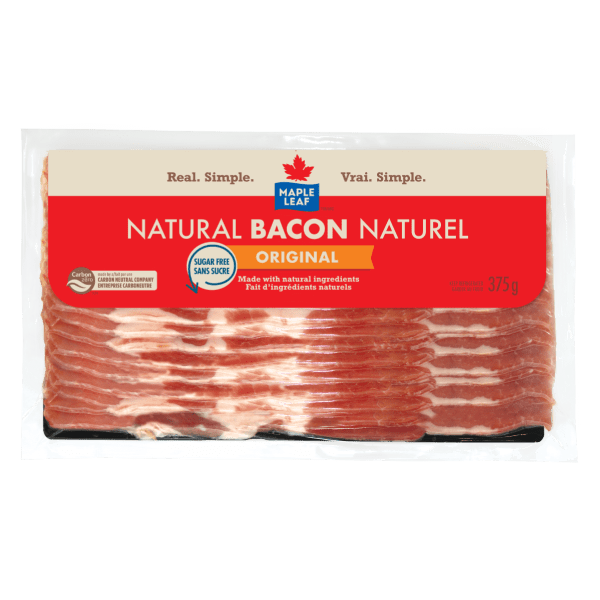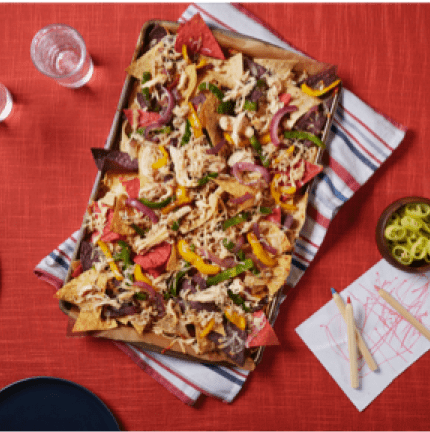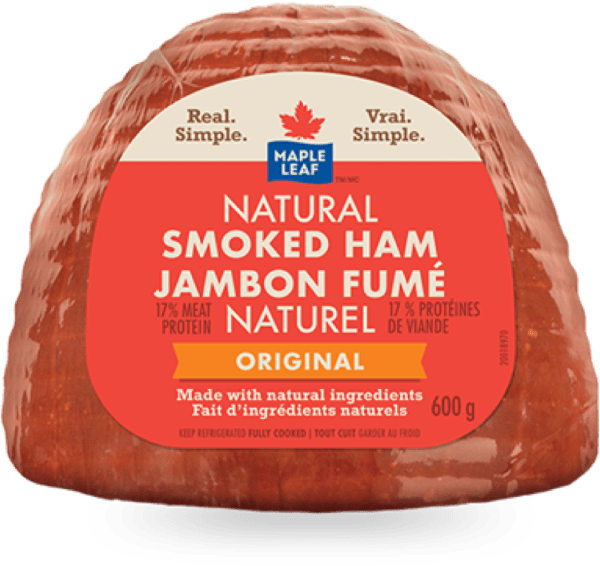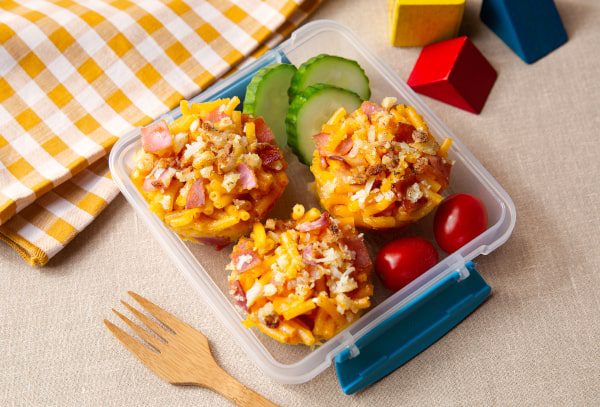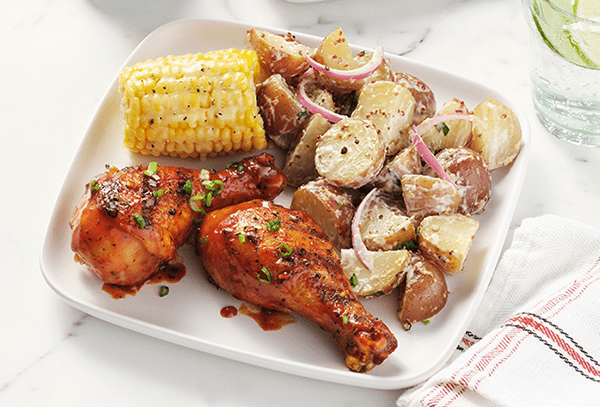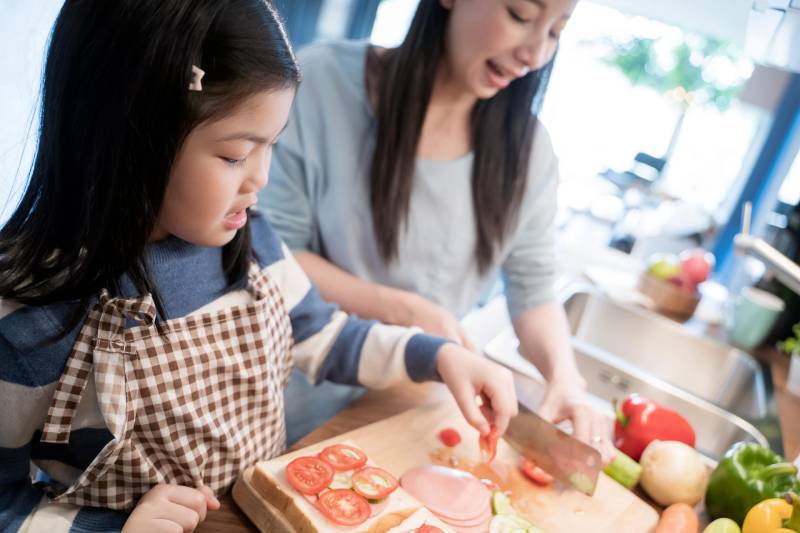Let’s get real.
Ingredients
What does “natural ingredient” mean?
In Canada, a “natural ingredient” is an ingredient that was not significantly changed, fortified, and does not contain artificial colours, flavours or food additives.
What does spice mean?
Some of our products use a combination of different spices to create their complex flavours. Instead of listing out each individual spice, we combine and list them as “spice” in our ingredient lists. For example, paprika, ginger and rosemary would all be listed under ‘spice’ in a Maple Leaf® Natural Top Dogs™ wieners.
Why is modified vinegar listed on your label?
Maple Leaf Foods is committed to real simple ingredients and that includes vinegar in some of our products. We use a form of vinegar called modified vinegar that is less acidic and less sour than standard vinegar. It is important to protect food safety.
It’s important to us that we are truthful and clear in our labelling –we’ve made that commitment in our Maple Leaf Food Manifesto. This includes identifying modified vinegar on our labels.
Products that specify modified vinegar on the label are the same wholesome and delicious products you’ve always enjoyed. Same recipe, same simple ingredients. The only thing that has changed is the label.
What is modified vinegar?
Vinegar is modified using a safe, government approved, food-grade version of sodium and potassium hydroxide. Food-grade sodium and potassium hydroxide are used in the production of many foods.
What does “real ingredient” mean?
In Canada, “real ingredient” is an ingredient that is not an imitation or substitute. They can also be called “true” or “genuine”.
Are your new products more healthy? Less processed? Better for me and my family?
Our goal is to make our food with only real, simple or natural ingredients, while still delivering the classic Maple Leaf taste. We still produce our products as we have always done, but we have removed all artificial flavours, preservatives, colours and sweeteners. The only ingredients left are real, simple or natural ingredients you can pronounce.
Why did you choose modified vinegar rather than another ingredient that could deliver the same benefits?
Modified vinegar is a simple ingredient that is proven to deliver important food safety protection.
What does “simple ingredient” mean?
A simple ingredient is an ingredient that is familiar, commonly recognized, readily available, with no artificial colours or flavours.
Do your products contain genetically modified organisms (GMOs)?
We can’t guarantee whether or not a product contains GMOs. Use of GMOs is deeply embedded in North American agriculture and so pervasive in the market that ingredients aren’t readily identifiable as being genetically modified. For more information please read Health Canada’s Mandate.
What foods contain modified vinegar?
Modified vinegar is widely used in pasta, baked goods, cheeses, nut butters and spreads, cut fruits and vegetables and a wide array of other foods.
Why can’t you use regular, unmodified vinegar?
Vinegar that is not modified to be less acidic would cause our products to taste sour and affect the texture of the product. Modified vinegar plays a key role in preventing spoilage and extending the shelf life of our products.
Animal welfare and industry
Does Maple Leaf own any poultry growing operations in Canada?
We do not largely own poultry growing operations but are one of Canada’s largest poultry processors and proudly support Canadian poultry farmers. All of our products are produced in federally registered and inspected establishments operating under the highest standards of food safety.
Where can I get more info on the treatment and healthcare of Maple Leaf’s animals?
Please find a wealth of information on Maple Leaf’s animal care commitment on our sustainability page.
How do you treat your animals?
We’re committed to enhancing our animal wellness practices in a manner that advances the Five Freedoms, the most widely accepted global standard for responsible animal care.
Handling and safety
I have an allergy. How do I know if your product is safe for me to eat?
Our products are made in multiple facilities and we are always changing and improving them. We take allergens very seriously, and strongly recommend you look at the label every time. We do not have a nut-free or gluten-free list for this reason.
How do I read the production code on the product I purchased?
Production codes indicate the date that a product was made, represented by a Julian code: the number of days since the first day of the year. For example: 156 would represent June 5, since it’s the 156th day of the year.
Where can I find more information on the proper handling for your products (storing, cleaning, etc.)?
Please check out our Food Safety at Home page.
Can you refreeze hot dogs that were thawed in the refrigerator?
Hot dogs can be thawed in the refrigerator and refrozen once. So before refreezing, divide the hot dogs into single-use amounts.
Where do I insert the meat thermometer to check for the temperature?
Insert an oven-safe meat thermometer deep into thickest part, taking care not to touch any bones or fat.
Once the package is opened, how long can I keep my product and still eat it?
As long as the meat has been refrigerated right away and wrapped well to keep it from drying out, it can be stored up to the days specified below:
- Cooked ham – up to 3-4 days
- Bacon – up to 7 days
- Raw sausage – up to 1-2 days
- Pre-cooked sausage links or patties – up to 7 days
- Opened hot dogs – up to 7 days
- Opened deli meat – up to 3-5 days
Visit Health Canada for detailed guidelines.
Hormones and antibiotics
Where can I get more information about the use of antibiotics in poultry?
You can find more info at chickenfarmers.ca.
Does the use of antibiotics in animals present a health risk to humans?
According to research studies, the use of approved veterinary antibiotics in animals does not present a major health risk to humans.
Do you use antibiotics as a preventative measure to stave off infections?
In Canada, approved veterinary antibiotics may be given to poultry flocks to reduce and prevent disease outbreaks, and to prevent any potential food safety problems. Please find the facts on our info sheet.
Are your products hormone free?
The use of growth-enhancing hormones in pigs and poultry are banned in Canada. No hormones have been added to our products, however, they cannot be called hormone-free as animals have naturally occurring hormones in their bodies.
Our chicken
What does raised without antibiotics mean?
For our chickens to be called Raised without Antibiotics, they must never have received any amount of antibiotics, ever.
How are your chickens raised?
Our chickens have room to roam and are raised cage-free in climate-controlled barns with access to food, water and social play at all times. They are also raised without the use of hormones or steroids. Maple Leaf Prime® RWA and Organic chickens are fed a vegetable grain diet and are never given antibiotics.
Why is raised without antibiotics important to me?
We believe in giving consumers a choice in how they feed their families. Whether you are sharing traditional, Organic or Prime® Raised without Antibiotics chickens, consumers should feel good about its quality and safety.
Is all chicken sold in Canada raised without antibiotics?
All store-bought chicken is technically “antibiotic free” because all antibiotics must clear an animal’s system before it gets processsed, even if they were once treated. That’s where Maple Leaf Prime® Raised without Antibiotics and Organic products assure Canadians that the chicken they feed their family is truely raised without antibiotics.
Why are antibiotics used in chicken?
Like people, animals sometimes get sick, and treating them is a responsible part of animal care. Our farmers work closely with veterinarians and experts to see if and when antibiotics are needed. In those cases, they won’t be sold as Prime® Raised without Antibiotics.
Where are your barns located?
We’re proud to raise all of our chickens on Canadian farms in Alberta and Ontario.
How does raising chicken without antibiotics affect the quality and taste of the meat?
You can always expect great tasting chicken from Maple Leaf. Raised without Antibiotics and traditionally-raised chicken taste exactly the same.
Is there a difference between raised without antibiotics and organic chicken?
Yes, there is! Raised without antibiotics means our chickens have never been treated with antibiotics in any way from hatch to processing. With Organic chickens, our birds are fed a certified organic diet with no animal by-products or antibiotics, and with CFIA-approved vitamins. They’re also given more space in barns with natural lighting and outdoor access.
How do you raise chickens so that they don’t need antibiotics? What do you do differently?
All of our chickens follow a special health program designed to promote and develop strong immune systems to help defend against any health issues without the use of antibiotics.
Is raising chicken raised without antibiotics more humane?
We proudly raise all our chickens humanely to the highest standards in Canada.
How do I know if a product is raised without antibiotics?
Just look for the raised without antibiotics claim on the packaging label!
With Maple Leaf Prime® Raised without Antibiotics, does that mean regular Maple Leaf Prime® Raised on Canadian Farms chicken have antibiotics?
With all chickens in Canada, any use of antibiotics is cleared by the time it gets to your store. Our traditionally-raised chickens are only treated with antibiotics when our vets and health experts agree it is necessary for their health.
